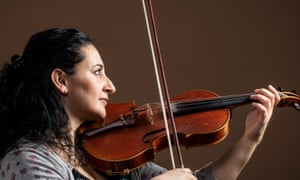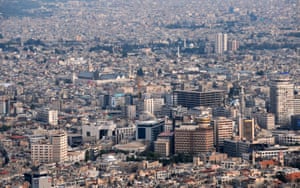
War in Syria forced the viola player into exile. She talks about working under bombardment, her new life, and playing Arabic music in the UK
Viola player Raghad Haddad was granted asylum in the UK in 2017 and now lives in Brighton. Tomorrow, she performs in a concert at St John’s Smith Square in London to raise money for Syrians made homeless by almost seven years of civil war. It’s not easy to concentrate on music when war is all around you, Haddad says, but for musicians “this is often the only thing we can do. It’s like a small home in our heart, where we can be safe for a little while.”
Born in Yabroud, a small town in the mountains north of Damascus, in 1981, Haddad started playing the viola when she was 16. She had been playing the piano since she was six, but when she heard the viola’s rich, tenor sound, she was captivated.
“It’s very deep, like a human voice,” Haddad says. “I just practised so much and fell in love with it that I stopped playing piano for a while.”
After graduating from the conservatoire in Damascus, she began teaching and leading a double musical life. While performing western classical music with the Syrian National Symphony Orchestra, Haddad was also playing music from the east with the Syrian National Orchestra for Arabic Music, a group that combined lush, swooping strings with traditional Arabic instruments such as the qanun, the oud and the riq.

When the civil war broke out in 2011, Haddad was 30 and had just got married. “We didn’t know what was going on,” she says, “just that there was something wrong.” Taking the bus to work at the opera house every day meant running a gauntlet of checkpoints and snipers along the 50 miles (80km) between Yabroud and Damascus, a journey that required all the more courage after the birth of her son in 2013.
“Some days it was very quiet, and other days not at all,” Haddad says. But each day she left the house in fear, praying that she would come back and returning relieved to have survived another day. She remembers one evening when a bomb fell on the courtyard outside the opera house as the audience was gathering for a performance. Twelve people were injured, but the concert went on.
“It is our job,” Haddad says. “Even while all this is happening, life must go on. People can’t stay at home and stop working, stop living.”
In 2016, she was invited to join an orchestra of Syrian musicians on a European tour as part of Damon Albarn’s Africa Express project. Haddad tried to convince her husband this was a way out – that she should claim asylum in the UK and wait for her family to join her – but with their son only three years old, he wouldn’t hear of it. While she was playing across Europe, appearing at the Southbank Centre in London and on Glastonbury’s Pyramid stage, the news came that the al-Nusra Front was preparing an assault on Yabroud. At the end of the tour, Haddad and eight other musicians decided to seek asylum in the UK.
“My English was a bit better than the others’,” she says, “so I volunteered to speak. I went up to the official, she stamped my passport, and I said: ‘Hello, we want to claim asylum.’ With big eyes, she asked: ‘Who?’ And I said: ‘All of us.’” Suspicious of what the bulky cases might contain, the officials started by separating the musicians from their instruments, and the long process of fingerprinting, interviews and background checks began.
At first, Haddad’s husband was “very angry”, she says, “because he thought I made the decision without him”, but eventually he came round. She was granted asylum six months later, with her family joining her in 2017, though after almost a year apart from her son, Haddad says she’s “still having some difficulties communicating with him”.
There are challenges in understanding how life works in a new country, but Haddad says Brighton has been very welcoming. Alongside work as a freelance musician and translator, she has been performing Arabic music with the newly founded London Syrian Ensemble and getting a tremendous response. She’s hoping Thursday’s concert will get a good response as well, not only by raising money for refugees, but also with its message that Syrians deserve to live in peace.
“We do what God gave us,” Haddad says. “He gave me this talent of music, so I can use it to spread this message. I don’t have a weapon, I don’t know how to use anything to express my feelings – apart from the viola.”
- The concert for peace in Syria is at St John’s Smith Square, London, on 1 March, in aid of the charity Help Refugees. The London Syrian Ensemble perform at St Giles, Cripplegate, London on 12 May.
Since you’re here …
… we have a small favour to ask. More people are
reading the Guardian than ever but advertising revenues across the media
are falling fast. And unlike many news organisations, we haven’t put up
a paywall – we want to keep our journalism as open as we can. So you
can see why we need to ask for your help. The Guardian’s independent,
investigative journalism takes a lot of time, money and hard work to
produce. But we do it because we believe our perspective matters –
because it might well be your perspective, too.
I appreciate there not being a paywall: it is more democratic for the media to be available for all and not a commodity to be purchased by a few. I’m happy to make a contribution so others with less means still have access to information. Thomasine F-R.
Hakuna maoni:
Chapisha Maoni